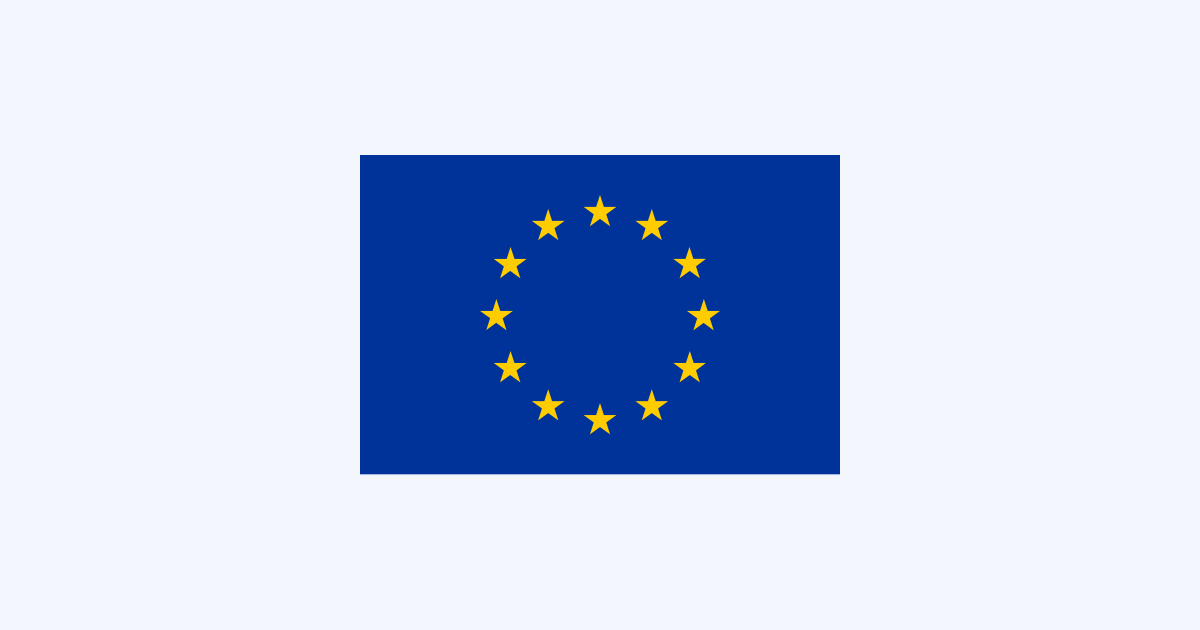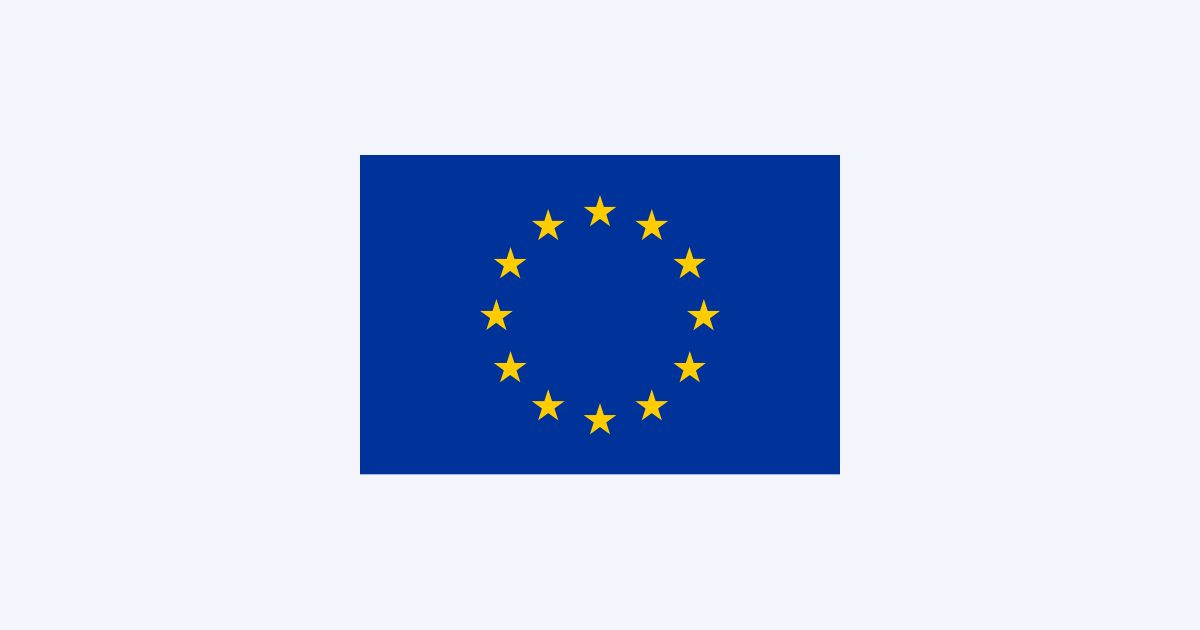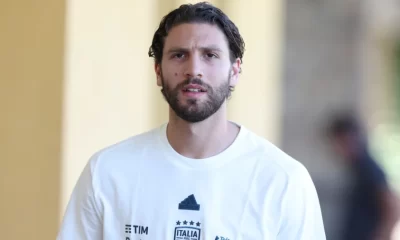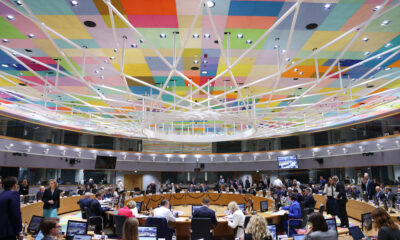Politics
Joint Statement by EU High Representative Kaja Kallas and Chile’s Minister of Foreign Affairs Alberto van Klaveren on the provisional application of the EU-Chile Advanced Framework Agreement

DISCLAIMER OPINIONS: The opinions of the authors or reproduced in the articles are the ones of those stating them and it is their own responsibility. Should you find any incorrections you can always contact the newsdesk to seek a correction or right of replay.
DISCLAIMER TRANSLATIONS: All articles in this site are published in English. The translated versions are done through an automated process known as neural translations. If in doubt, always refer to the original article. Thank you for understanding.
DISCLAIMER PHOTOS: We mostly used photos images that are readily available online, from free sources, or from the people promoting the news. If by any chance it happens that we have used one of your copyrighted photos, please do not hesitate to contact us and we will take it down without question. We do not make profits as this is a not for profit project to give voice to the voiceless while giving them a platform to be informed also of general news, and it is completely free.
Politics
EUDA welcomes Belgian National Drug Commissioner

This week, the EUDA hosted the Belgian National Drug Commissioner, Ine Van Wymersch, during her two-day visit to Lisbon. Ms Van Wymersch was accompanied by Deputy Commissioner Fabien Gerard and other members of the Belgian National Drug Commission.
During the visit, on 3 June, the delegation received an in-depth overview of the agency’s work. EUDA Executive Director Alexis Goosdeel presented the agency’s new mandate and its current state of implementation. EUDA experts followed, with briefings on key areas of the agency’s activity, including drug markets, crime and precursors, prison-related…
Source link
Politics
eu-LISA Industry Roundtable June 2025 – Registration Now Closed

Building Better Government Software at Scale – Agile, DevSecOps and Software Factories
The next edition of the Industry Roundtable, titled ‘Building Better Government Software at Scale – Agile, DevSecOps and Software Factories’, will take place on 11-12 June 2025 in Warsaw, Poland, under the patronage of the Polish Presidency of the Council of the EU. The event will be organised in a hybrid format allowing for in-person and online participation. This iteration will focus on the benefits that new technology trends such as Software Factories – built upon the principles of Agile approaches and DevSecOps methodologies – can bring to the EU public sector organisations (both at MS and EU levels). The event will also feature presentations and discussions on new technological solutions that can help to achieve those benefits while addressing some of the pending challenges.
EU institutions are increasingly relying on digital solutions, which are often complex and require significant investment in IT and software development. To meet the fast pace of delivery, public sector authorities are adopting cutting-edge methodologies like Agile, DevSecOps, and Software Factories, as well as technologies such as cloud computing, automation, and AI.
Registrations for the eu-LISA Industry Roundtable are now closed.
Agile methodologies
Agile methodologies provide a structured yet flexible approach to managing complex IT projects, enabling institutions to deliver services and applications faster while adapting to evolving needs. Agile allows public institutions to prioritise user-centric development, iteratively improving systems to meet high standards of accessibility and inclusivity. Furthermore, Agile fosters collaboration across departments, breaking down silos and ensuring that IT projects align with broader organizational goals. For EU institutions managing diverse and cross-border initiatives, this collaborative and adaptive framework is essential for driving cohesion and innovation.
DevSecOps
DevSecOps integrates software development and IT operations and further strengthens security and data protection by design, integrating security and data protection into every phase of the software development lifecycle, a critical need in today’s heightened cybersecurity landscape. As EU public sector institutions handle vast amounts of sensitive data, embedding security and data protection by design, reduces vulnerabilities and enhances compliance with regulations like the General Data Protection Regulation (GDPR), EUDPR, Regulation for Cybersecurity of EU Institutions or the NIS2 Directive.
Software Factories
Coupled with the concept of Software Factories — highly automated environments for rapid and scalable software development — these methodologies provide EU institutions with the ability to respond swiftly to new legislative mandates, security threats, or societal challenges. The Software Factory approach is also a powerful tool that can be used by public institutions to become more independent in their software design and development, and less reliant on outsourcing to external contractors for the fulfilment of IT projects. The increased level of IT self-sufficiency and technical ownership brought by the implementation of Software Factories can be key to improve performance in areas such as:
- Improved control over the products and systems offered which, in turn, will result in faster and more economically efficient ways to adapt such services to changing demands and regulations,
- Better management and more efficient use of resources (both human and financial),
- Lowering of potential risks related to guaranteeing long-term services (e.g., vendor lock-in situations, market discontinuity of products), and
- Shorter time-to-market.
Together, Agile, DevSecOps, and Software Factories, combined as well with other innovative IT practices such as cloud computing or AI-based tools, empower public institutions to build secure, efficient, and citizen-focused digital ecosystems while fostering trust and resilience across the Union.
About the Industry Roundtable
The eu-LISA Industry Roundtable is a collaborative platform that convenes representatives from the industry, Member States’ authorities, and EU institutions to facilitate an open dialogue on the latest technological advancements and innovations in the migration and home affairs domain. This forum enables eu-LISA stakeholders to share knowledge, exchange best practices, and discuss the potential applications and implications of emerging technologies, such as artificial intelligence, biometrics, and data analytics, in supporting the Agency’s mission to manage EU’s large-scale IT systems for migration, asylum, and border management. By fostering a spirit of cooperation and information-sharing, the eu-LISA Industry Roundtable helps to identify opportunities, address challenges, and shape the future of technology-enabled solutions in the field of migration and home affairs.
Source link
Politics
safeguarding our ocean and economy

Speech by Christine Lagarde, President of the ECB, at the Blue Economy and Finance Forum in Monaco
Monaco, 7 June 2025
It is a pleasure to speak at the Blue Economy and Finance Forum.
In his 1857 poem “Man and the Sea”, Charles Baudelaire explored the deep kinship between the ocean and humanity.[[1] For Baudelaire, they were two forces drawn together by awe, fascination, and even conflict.
Today, that dynamic has taken on a new and troubling dimension. We rely on the ocean for climate stability and economic prosperity, yet we are fuelling a climate crisis that threatens to undermine the very system we depend on. We cannot let that happen.
Baudelaire described the sea as a “mirror” to the human soul. We now need to take a hard look in that mirror and ask ourselves: what can we do to stem the tide of this crisis, to safeguard our ocean and economy?
This morning’s two panel discussions will go a long way towards answering that question. But I would like to take this opportunity to open the plenary session with a few thoughts – about what is at stake, and what stakeholders can do about it.
The ocean’s importance for our climate and economy
The ocean is home to 95% of the planet’s biosphere.[[2] It spans environments as varied as sunlit coral reefs and pitch-black abyssal plains. And it supports an immense range of life, from countless microscopic organisms to the world’s largest animal, the blue whale.
Given the ocean’s richness, it is worth preserving in its own right. But its value does not end there – the ocean also benefits humanity in two vital ways.
First, it is one of the planet’s most powerful allies in the fight against climate change.
The ocean helps to regulate global temperatures by absorbing vast amounts of heat and redistributing it through major currents like the Gulf Stream. It is also the world’s largest carbon sink, reducing the amount of carbon dioxide in the atmosphere and helping to slow global warming.
The Intergovernmental Panel on Climate Change finds that the ocean has absorbed over 90% of the excess heat trapped in the earth’s system, as well as a third of the carbon dioxide that humans have emitted since the Industrial Revolution.[[3]
Second, a sustainable ocean serves as an important pillar supporting the global economy, providing for food security and economic opportunities.
Marine ecosystems support over three billion people who rely on fish for at least 20% of their animal protein intake. Indeed, this dependency is more pronounced in some of the least-developed countries, where seafood provides most of the animal protein consumed.[[4]
These ecosystems also help sustain employment opportunities. More than 150 million jobs depend on the production, trade and consumption of ocean-based goods and services, according to the United Nations.[[5] The ocean is also home to key natural resources, such as medicines and biofuels, which are vital for ongoing advances in healthcare and clean energy sectors.
So, there is a great deal at stake in preserving the ocean’s health.
The threat of climate change
But today we are placing the sustainability of our ocean under extraordinary stress, with serious implications for both our climate and economy.
Without the ocean’s capacity to absorb heat and carbon, we would have had to contend with a faster, even more dangerous pace of global warming. Yet there are now signs that this capacity is becoming strained.
The last ten years were the ocean’s warmest on record. Warmer oceans are driving more frequent marine heatwaves, which damage ecosystems, and have been a major contributor to rising sea levels due to the thermal expansion of seawater. The rate at which the global mean sea level is rising has more than doubled over the past three decades.[[6]
On top of this, the ocean’s absorption of carbon dioxide is driving acidification.
Combined with ocean warming, acidification is contributing to the bleaching and death of coral reefs, which are vital for supporting fisheries and protecting coastlines from storms. Since 2023 over 80% of the world’s coral reefs have been affected by bleaching.[[7]
We find ourselves in dangerous waters. Together, these changes could have profound consequences for the global economy.
Food security may be undermined, potentially leading to more volatile prices, which is a concern for central banks tasked with safeguarding price stability. And if coastal areas become unliveable due to rising sea levels or frequent flooding, people may be forced to move. More than 600 million people around the world live in coastal areas that are less than ten metres above sea level.[[8]
Stemming the tide
So, what can we do to stem the tide of these troubling developments? We may not be able to fully reverse the damage done, but we can work towards slowing its momentum, potentially even stopping it, by acting on two important fronts.
First, we need to protect. That means cutting greenhouse gas emissions decisively and keeping the goals of the Paris Agreement within reach.
If we succeed in doing so, we could limit sea level rise to around half a metre by the end of the century. That might not sound reassuring. But every tenth of a degree we avoid is a piece of coastline preserved, a reef protected or a storm surge weakened.
We also need to protect the natural systems that shield us from floods. Nature-based solutions – for instance, restoring mangroves, marshes and coral reefs – offer powerful, cost-effective defences against extreme weather. Coral reefs alone can reduce wave energy by an average of 97% while supporting fisheries, tourism and coastal livelihoods.[[9]
The second front is just as important: we need to prepare.
Whether we like it or not, climate-related risks are materialising. We need to adapt our infrastructure and economies to a more volatile world. That includes building sea walls and surge barriers and budgeting for resilience rather than reacting after disaster strikes.
Make no mistake: adaptation will be costly. According to UN assessments, costs could run into the hundreds of billions of dollars globally each year by mid-century.[[10] But the cost of inaction would be far higher. One study estimates that failing to keep global temperatures below two degrees above pre-industrial levels could lead to USD 14 trillion in global annual flood costs by 2100.[[11]
To meet this challenge, we need to catalyse finance for marine and coastal conservation – for instance, through innovative approaches that convert natural capital into financial capital.[[12]
This can be especially impactful for vulnerable countries with limited fiscal space. Above all, we must listen to the communities affected, treating their needs as a basis for our actions rather than an afterthought.
Let me conclude.
Baudelaire reminds us that the sea is a mirror of our own nature, which can either heal or harm.
So, let us choose to heal. That means nurturing the ocean’s rich diversity and facilitating finance to support innovative adaptation measures that build more resilient communities and a stronger global economy.
Thank you.
-
EU & the World7 days ago
Aurora Borealis Forecast: Where & When to See the Northern Lights Tonight
-

 Sports6 days ago
Sports6 days agoManuel Locatelli forced to leave Italy's training camp
-

 Sports6 days ago
Sports6 days agoRepublic Day to remember for Team Calcagni: Alessandro Patrono also triumphs
-

 Politics6 days ago
Politics6 days agoEyes in the Sky: Europe Doubles Down on Satellite Data to Safeguard the Future
-

 Sports6 days ago
Sports6 days agoRoland Garros, Alexander Bublik sends clear message to Jannik Sinner and Andrey Rublev
-

 Politics6 days ago
Politics6 days agoEU Launches Landmark €150 Billion Defence Initiative to Bolster Security and Deterrence
-

 Politics6 days ago
Politics6 days agoEU Turns Its Gaze on the Porn Giants: Brussels Launches Landmark Investigation to Shield Minors Online
-

 Politics5 days ago
Politics5 days agoNature, climate, and circular economy projects emerge as winners at the 2025 LIFE Awards









